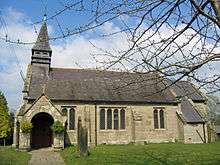St John's Church, Burwardsley
St John's Church is in School Lane, Burwardsley, Cheshire, England. It is recorded in the National Heritage List for England as a designated Grade II listed building.[1] It is an active Anglican parish church in the diocese of Chester, the archdeaconry of Chester and the deanery of Malpas. Its benefice is combined with those of Holy Trinity, Bickerton, St Wenefrede, Bickley, and All Saints, Harthill.[2]
| St John's Church, Burwardsley | |
|---|---|
 St John's Church, Burwardsley, from the south | |
 St John's Church, Burwardsley Location in Cheshire | |
| OS grid reference | SJ 515,565 |
| Location | Burwardsley, Cheshire |
| Country | England |
| Denomination | Anglican |
| Website | St John the Evangelist, Burwardsley |
| History | |
| Status | Parish church |
| Dedication | St John the Evangelist |
| Architecture | |
| Functional status | Active |
| Heritage designation | Grade II |
| Designated | 19 June 1984 |
| Architect(s) | John Douglas (restoration) |
| Architectural type | Church |
| Completed | c. 1878 |
| Specifications | |
| Materials | Ashlar buff sandstone Welsh slate roof |
| Administration | |
| Parish | Burwardsley |
| Deanery | Malpas |
| Archdeaconry | Chester |
| Diocese | Chester |
| Province | York |
| Clergy | |
| Rector | Revd Lameck Mutete |
History
The church originates from the 17th century. It has a buttress dated 1730, and the church was restored in 1795.[1] In 1871 a further restoration was carried out by the Chester architect John Douglas, which included the addition of a bell turret.[3] Another restoration, with the addition of a chancel which has been attributed to Douglas, was carried out in about 1878.[4]
Architecture
Exterior
St John's is constructed in ashlar buff sandstone with a Welsh slate roof. Its plan consists of a three-bay nave, a one-bay chancel with a side chapel, and a south porch. The bays of the nave are divided by buttresses and they have two or four-light mullioned windows with arch-headed lights. The east window has three round-headed lights, the central one being taller. The west window is simple with Y-tracery. The bell turret is at the west end and has a pyramidal roof.[1]
External features
The churchyard contains the war graves of two soldiers of World War I.[6]
See also
References
Citations
- Historic England, "Church of St John, Burwardsley (1278838)", National Heritage List for England, retrieved 2 April 2012
- St John the Evangelist, Burwardsley, Church of England, retrieved 2 October 2009
- Hubbard (1991), pp. 139, 242
- Hubbard (1991), p. 249
- Cheshire, Burwardsley, St. John (H00008), British Institute of Organ Studies, retrieved 3 December 2010
- BURWARDSLEY (ST. JOHN THE DIVINE) CHURCHYARD, Commonwealth War Graves Commission, retrieved 3 February 2013
Sources
- Hubbard, Edward (1991), The Work of John Douglas, London: The Victorian Society, ISBN 0-901657-16-6
Further reading
- Hartwell, Clare; Hyde, Matthew; Hubbard, Edward; Pevsner, Nikolaus (2011) [1971], Cheshire, The Buildings of England, New Haven and London: Yale University Press, p. 198, ISBN 978-0-300-17043-6